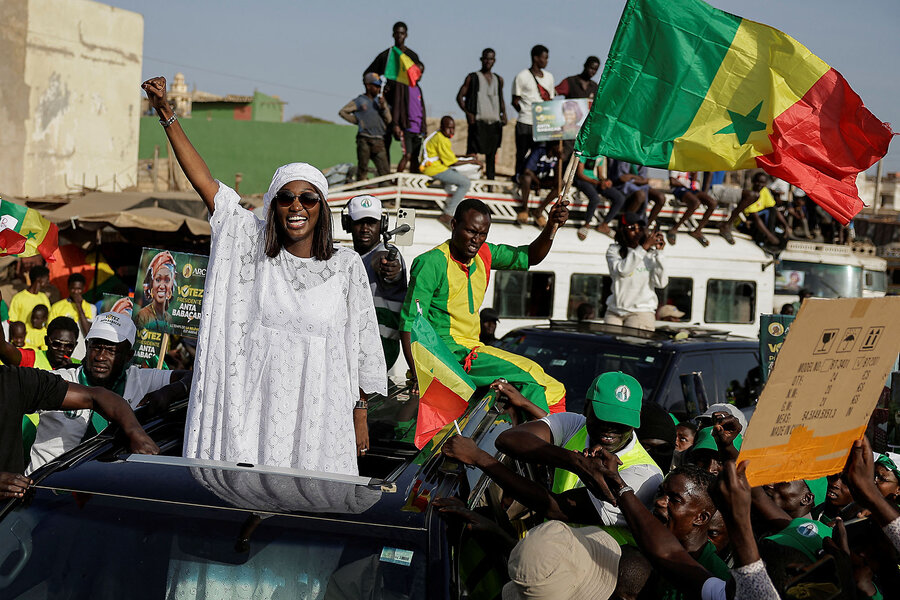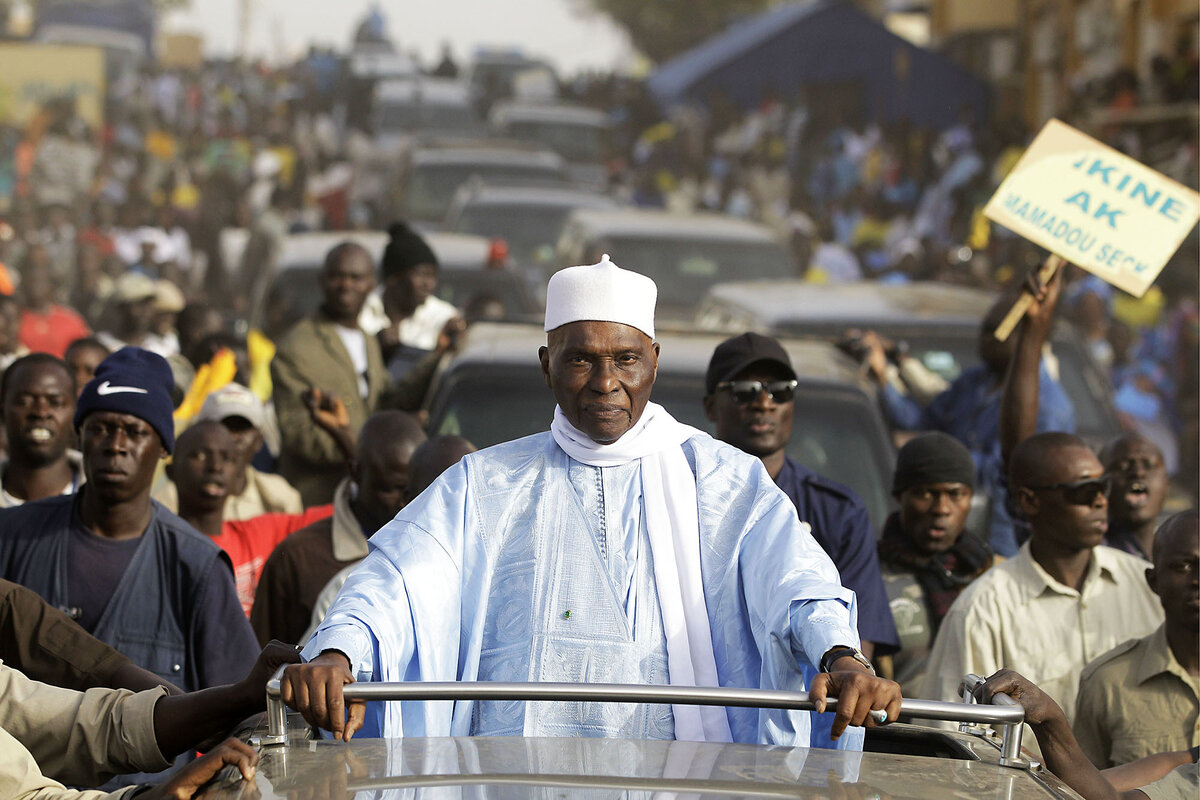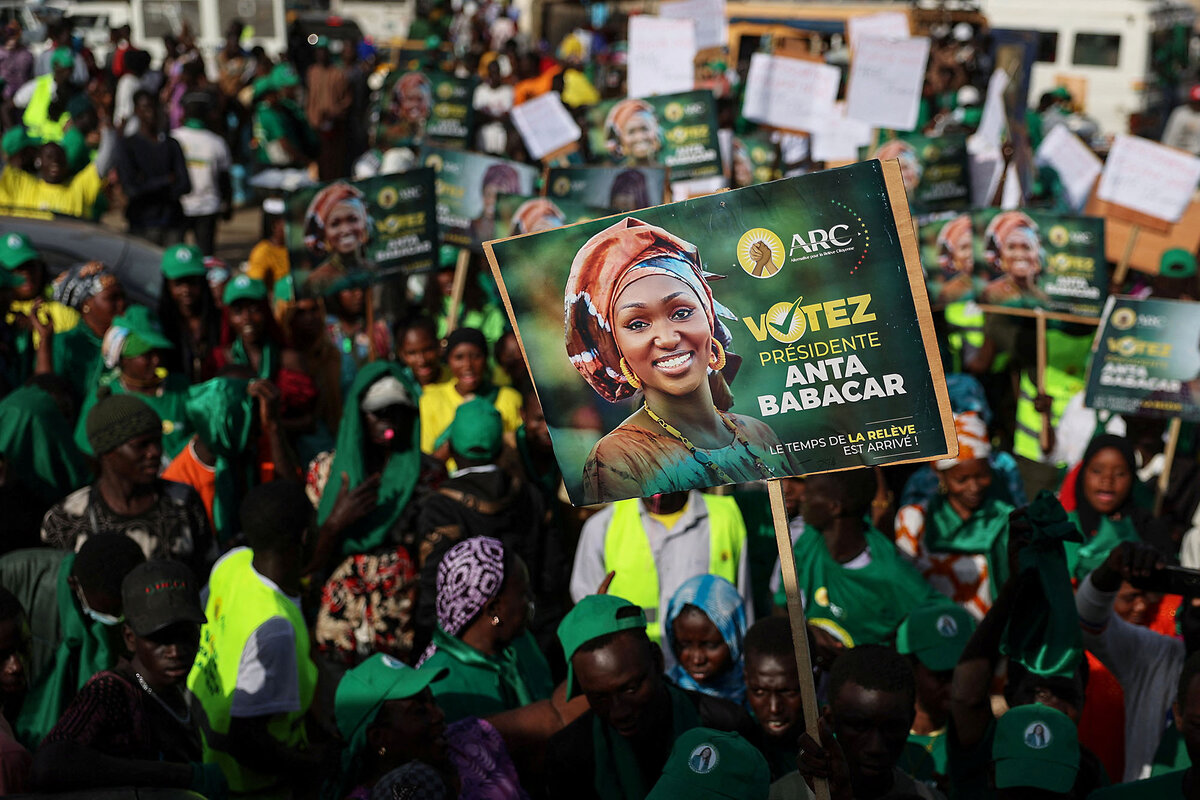Women are fighting for more than political power in Senegal’s presidential election
Loading...
| Dakar
It’s presidential campaign season in Senegal’s capital city and all over town the candidates’ faces beam down at voters from posters tacked to light poles and plastered on billboards. Eighteen people are running, and at times, their images seem to blend together: a sea of older men in dark, dour suits. But one face stands out.
In her pastel blue headwrap and green dress, Anta Babacar Ngom cuts a strikingly different figure. For one thing, at 40 years old she’s a generation younger than many of the other candidates. For another, she’s a she.
Although no one expects Ms. Ngom to become the next president, her presence in the race speaks to the increasingly forceful role of women in the politics of Senegal, which has one of the highest percentages of female legislators in the world.
Why We Wrote This
A story focused onWomen are playing an increasingly forceful role in Senegalese politics. As the country prepares to vote in its presidential election Sunday, women are making their voices heard as candidates, voters, and protesters.
“Leadership is about fighting your way through,” says Aminata Touré, who served as Senegal’s appointed prime minister from 2013 to 2014.
Indeed, in the run-up to Sunday’s controversial vote, women were often at the forefront of protests against the government’s attempt to postpone the election. Prominent political leaders like Ms. Touré pushed the current president, Macky Sall, to step down at the end of his term and hold elections as promised. Ms. Ngom was herself briefly detained at one such demonstration. Prior to the election campaign, she was best known as the CEO of a poultry company who made waves in 2019 when she opened Senegal’s first KFC – with an all-female staff.
Seeing women break the mold in these ways has an importance that “goes beyond politics,” Ms. Touré says.
The fight for parity
Ms. Ngom is the first woman to appear on Senegal’s presidential ballot since 2012. And her presence there is the result of a hard-fought battle by women’s organizations to make sure Senegal’s women had a seat at the table.
In the mid-1990s, these groups began campaigning for a so-called “parity law,” which would create quotas for women’s representation in politics. These kinds of quotas were surging in popularity globally, but in Senegal, activists struggled to win support for the idea.
“Some said no, because it’s not our culture,” says Rokhiatou Gassama, president of COSEF, the Senegalese Women’s Council, which promotes a greater role for women in society. “They said this law disturbed our families.”
At the time, she says, some male politicians and marabouts, or religious leaders, were uncomfortable with a parity law because it suggested women were equal to men.
But activists eventually found an ally in Abdoulaye Wade, who was elected Senegal’s president in 2000 as a modern reformer. He pushed for quotas too, and in 2010, Senegal’s parliament passed a law requiring at least half of every political party’s slate of candidates for office to be women.
Overnight, the law transformed Senegalese politics. In the next election, in 2012, the number of women who held seats in the national assembly doubled – from 22.7% to 42.7%. In local elections, the results were even more dramatic. Women’s representation in regional legislatures went from 16% in 2010 to 47% after elections in 2014.
Today, Senegal has one of the highest percentages of female lawmakers in the world. One important ripple effect of quotas has been to normalize women’s leadership. In 2019, for instance, Dakar elected its first female mayor since Senegalese independence, English professor and former beauty queen Soham El Wardini.
“You have to make sure that people respect you. And sometimes it comes in a confrontational way,” says Ms. Touré, who earned the nickname “Iron Lady” during her tenure as Senegal’s justice minister, before being appointed prime minister in 2013. “I did not beg for respect,” she says.
A fraught campaign
Ms. Touré served only a year as prime minister, but she remains a forceful voice in Senegalese politics. Last month, she was arrested in a thick cloud of tear gas at a protest denouncing Mr. Sall’s decision to postpone the presidential election, which was initially scheduled for late February.
Although a new date was set a few weeks later, the ordeal “severely tested” Senegal’s democracy, says Alioune Tine, founder of the Afrikajom Center, a Senegalese political think thank. But he says the reaction of Senegalese citizens – including its women – has been encouraging. “There was resistance from Senegalese citizens,” he adds. Ultimately, “I think that is good for democracy.”
For women, however, the campaign season has been particularly fraught because of allegations swirling around the most prominent leader of the opposition, Ousmane Sonko. He was barred from the ballot after being convicted last year of “corrupting youth” in connection with a coercive sexual relationship he had with a young masseuse.
He and his supporters claimed the charges were politically motivated, and his imprisonment touched off major protests. But his ugly and sexist comments about his accuser’s appearance and motives prompted activists to denounce him for reinforcing and normalizing a culture of rape.
In that context, many Senegalese women are watching Ms. Ngom’s campaign for president with particular interest.
“I think she is very courageous,” says Mary Mendoza, a university student. Just by running for president, she says, Ms. Ngom is sending the message that women belong in the highest echelons of Senegalese society.
It is a sentiment shared by fellow student Diariatou Mbow.
“In this country, we have strong women but the patriarchal society tries to limit them,” says Ms. Mbow. “Anta Babacar is encouraging a lot of young women like myself.”







